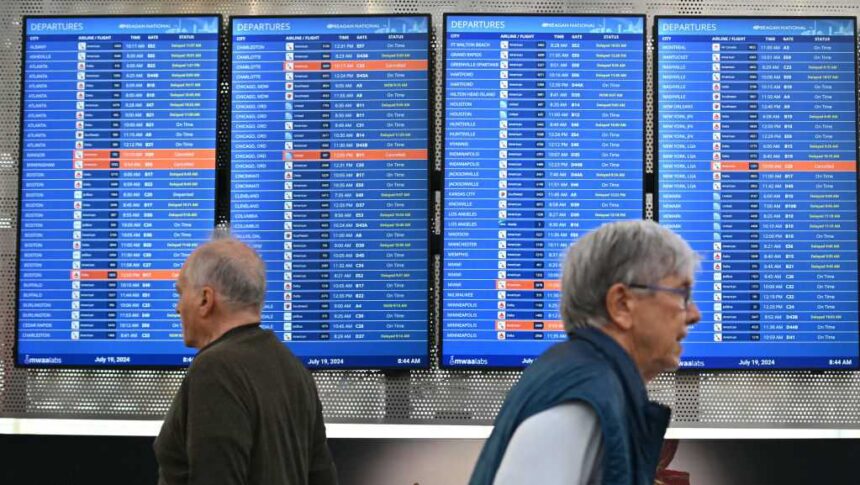A global technology outage caused by a faulty software update grounded flights, knocked media outlets offline, and disrupted hospitals, small businesses and government offices on Friday, highlighting the fragility of a digitized world dependent on just a handful of providers.The trouble with the update issued by cybersecurity firm CrowdStrike affected customers running Microsoft Windows. It was not the result of hacking or a cyberattack, according to CrowdStrike, which apologized and said a fix was on the way.But hours later, the disruptions continued for many companies, and they scrambled to deal with the fallout.A glance at what’s been impactedBanks offline? Don’t panic. Here are steps you can take to access your account Recovering from the global tech outage could be a long, arduous process Social Security offices closed due to global outage 911 call centers in some US states impacted by global technology outage Disruption hits American flight industry hard Global tech outage delays flights for thousands leaving RNC in MilwaukeeWhat is Crowdstrike, the company responsible for the global outage? Thousands of flights were canceled, and tens of thousands were delayed around the world, leading to long lines at airports in the U.S., Europe and Asia. Airlines lost access to check-in and booking services in the heart of the summer travel season.Several local TV stations in the U.S. were prevented from airing the news early Friday, and some state and local governments reported problems at courts, motor vehicles departments, unemployment agencies and other offers.Video above: Cybersecurity expert explains how to protect yourself after global outage, how you can prevent future issuesAffected hospitals had problems with appointment systems, forcing them to suspend patient visits and cancel some surgeries.Alison Baulos said her 73-year-old father’s emergency heart surgery in Paducah, Kentucky, was canceled Friday morning because of the tech outage, leaving her family scared and worried.”So if anything happens, it would be as a result of not having the surgery this morning,” Baulos said in an interview. She said her father was waiting at Baptist Hospital to find out what would happen next. A phone message left with the hospital was not immediately returned.Elsewhere, people experienced minor inconveniences, including trouble ordering ahead at Starbucks, causing long lines to form at some of the coffee chain’s stores.A disturbing reminder of vulnerabilityCyber expert James Bore said real harm would be caused. “All of these systems are running the same software,” Bore said. “We’ve made all of these tools so widespread that when things inevitably go wrong — and they will, as we’ve seen — they go wrong at a huge scale.”The head of Germany’s IT security agency, Claudia Plattner, said “we can’t expect a very quick solution.” A forecast for when exactly all systems will be up and running is difficult, but “it won’t be hours,” she added.CrowdStrike said in a recording on its customer service line that the problem was related to “the Falcon sensor,” referring to one of its products used to block online attacks. The company says it has 29,000 customers.Video above: CrowdStrike CEO says company has ‘identified, isolated and deployed a fix’ to tech issueIn an interview on NBC’s “Today Show,” CrowdStrike CEO George Kurtz apologized, saying the company was “deeply sorry for the impact that we’ve caused to customers, to travelers, to anyone affected by this, including our companies.””We know what the issue is” and are working to remediate it, Kurtz said.Shares of the company, which is based in Austin, Texas, fell nearly 10% on Friday. Microsoft’s stock price fell more than 3%.Though the outage’s impact could be felt far and wide, the forecasting firm Capital Economics said it was likely to have little impact on the world economy.Air travel delayed everywhereMost airlines attributed the problems to their booking systems. Thousands of flights were affected in the U.S. alone, though by late morning on the East Coast airlines said they were beginning to mitigate problems and resume some service.Airlines and railways in the U.K. experienced long wait times. And airports across Europe suspended landings or halted takeoffs for several hours due to difficulties in checking in passengers.Saskia Oettinghaus, a member of the German Olympic diving team, was among those stuck at the Berlin Airport.”We are on our way to Paris for the Olympic Games and now we are at a standstill here for the time being,” Oettinghaus said.Other athletes and spectators traveling to Paris were delayed, as were their uniforms and accreditations, but Games organizers said disruptions were limited and didn’t affect ticketing or the torch relay.Broadcasters go dark, surgeries delayed, ‘blue screens of death’In Australia, national news outlets — including public broadcaster ABC and Sky News Australia — were unable to broadcast on their TV and radio channels for hours. Some news anchors went on air online from dark offices, in front of computers showing blue error screens. Internet and phone providers were also affected. Video above: Surgeries, non-emergent procedures canceled at hospitalsHospitals in different countries also reported problems.Britain’s National Health Service said the outage caused problems at most doctors’ offices across England. NHS England said in a statement said the glitch was affecting the appointment and patient record system used across the public health system.At Mass General Brigham, the largest health care system in Massachusetts, all scheduled non-urgent surgeries, procedures, and medical visits were canceled Friday because of the outage, according to a spokesperson. Emergency departments remained open.Shipping was disrupted, too.A major container hub in the Baltic port of Gdansk, Poland, the Baltic Hub, said it was battling problems resulting from the global system outage. And at the twin ports of Los Angeles and Long Beach, marine terminals were affected but the outage didn’t cause significant disruption.”Basically, it’s been minimal impact overnight and we’re going to have to wait and see how these terminals come up over the next several hours,” said Phillip Sanfield, a spokesperson for the Port of Los Angeles.
A global technology outage caused by a faulty software update grounded flights, knocked media outlets offline, and disrupted hospitals, small businesses and government offices on Friday, highlighting the fragility of a digitized world dependent on just a handful of providers.
The trouble with the update issued by cybersecurity firm CrowdStrike affected customers running Microsoft Windows. It was not the result of hacking or a cyberattack, according to CrowdStrike, which apologized and said a fix was on the way.
But hours later, the disruptions continued for many companies, and they scrambled to deal with the fallout.
A glance at what’s been impacted
Thousands of flights were canceled, and tens of thousands were delayed around the world, leading to long lines at airports in the U.S., Europe and Asia. Airlines lost access to check-in and booking services in the heart of the summer travel season.
Several local TV stations in the U.S. were prevented from airing the news early Friday, and some state and local governments reported problems at courts, motor vehicles departments, unemployment agencies and other offers.
Video above: Cybersecurity expert explains how to protect yourself after global outage, how you can prevent future issues
Affected hospitals had problems with appointment systems, forcing them to suspend patient visits and cancel some surgeries.
Alison Baulos said her 73-year-old father’s emergency heart surgery in Paducah, Kentucky, was canceled Friday morning because of the tech outage, leaving her family scared and worried.
“So if anything happens, it would be as a result of not having the surgery this morning,” Baulos said in an interview. She said her father was waiting at Baptist Hospital to find out what would happen next. A phone message left with the hospital was not immediately returned.
Elsewhere, people experienced minor inconveniences, including trouble ordering ahead at Starbucks, causing long lines to form at some of the coffee chain’s stores.
A disturbing reminder of vulnerability
Cyber expert James Bore said real harm would be caused. “All of these systems are running the same software,” Bore said. “We’ve made all of these tools so widespread that when things inevitably go wrong — and they will, as we’ve seen — they go wrong at a huge scale.”
The head of Germany’s IT security agency, Claudia Plattner, said “we can’t expect a very quick solution.” A forecast for when exactly all systems will be up and running is difficult, but “it won’t be hours,” she added.
CrowdStrike said in a recording on its customer service line that the problem was related to “the Falcon sensor,” referring to one of its products used to block online attacks. The company says it has 29,000 customers.
Video above: CrowdStrike CEO says company has ‘identified, isolated and deployed a fix’ to tech issue
In an interview on NBC’s “Today Show,” CrowdStrike CEO George Kurtz apologized, saying the company was “deeply sorry for the impact that we’ve caused to customers, to travelers, to anyone affected by this, including our companies.”
“We know what the issue is” and are working to remediate it, Kurtz said.
Shares of the company, which is based in Austin, Texas, fell nearly 10% on Friday. Microsoft’s stock price fell more than 3%.
Though the outage’s impact could be felt far and wide, the forecasting firm Capital Economics said it was likely to have little impact on the world economy.
Air travel delayed everywhere
Most airlines attributed the problems to their booking systems. Thousands of flights were affected in the U.S. alone, though by late morning on the East Coast airlines said they were beginning to mitigate problems and resume some service.
Airlines and railways in the U.K. experienced long wait times. And airports across Europe suspended landings or halted takeoffs for several hours due to difficulties in checking in passengers.
Saskia Oettinghaus, a member of the German Olympic diving team, was among those stuck at the Berlin Airport.
“We are on our way to Paris for the Olympic Games and now we are at a standstill here for the time being,” Oettinghaus said.
Other athletes and spectators traveling to Paris were delayed, as were their uniforms and accreditations, but Games organizers said disruptions were limited and didn’t affect ticketing or the torch relay.
Broadcasters go dark, surgeries delayed, ‘blue screens of death’
In Australia, national news outlets — including public broadcaster ABC and Sky News Australia — were unable to broadcast on their TV and radio channels for hours. Some news anchors went on air online from dark offices, in front of computers showing blue error screens. Internet and phone providers were also affected.
Video above: Surgeries, non-emergent procedures canceled at hospitals
Hospitals in different countries also reported problems.
Britain’s National Health Service said the outage caused problems at most doctors’ offices across England. NHS England said in a statement said the glitch was affecting the appointment and patient record system used across the public health system.
At Mass General Brigham, the largest health care system in Massachusetts, all scheduled non-urgent surgeries, procedures, and medical visits were canceled Friday because of the outage, according to a spokesperson. Emergency departments remained open.
Shipping was disrupted, too.
A major container hub in the Baltic port of Gdansk, Poland, the Baltic Hub, said it was battling problems resulting from the global system outage. And at the twin ports of Los Angeles and Long Beach, marine terminals were affected but the outage didn’t cause significant disruption.
“Basically, it’s been minimal impact overnight and we’re going to have to wait and see how these terminals come up over the next several hours,” said Phillip Sanfield, a spokesperson for the Port of Los Angeles.










